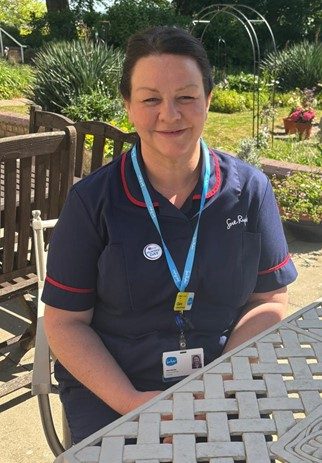19 January 2026
Have your say on proposals to relocate Mount Vernon Cancer Centre to…
From today (Monday 19 January), members of the public, patients, staff and stakeholders can share their views on proposals to relocate the Mount Vernon Cancer…


Home » News » Changing the culture of dying, together
Claire Bunday, community manager at Sue Ryder Palliative Care Hub, St John’s Hospice, writes:

During Dying Matters Awareness Week, like many palliative care, end of life care and bereavement charities, Sue Ryder has been proud to stand at the forefront of a movement which seeks to transform how people in the UK experience death, dying and grief.
As a charity we are striving to create a shift that breaks down the barriers to talking about death and dying, and supports people to prepare and plan for their final days with dignity, compassion and choice.
So this year’s Dying Matters Awareness Week theme ‘The Culture of Dying Matters’ provided me and my colleagues at Sue Ryder with the perfect opportunity to speak, listen and reflect on the kind of culture we want to build around death.
Here are some of my thoughts and our reflections.
As the manager of a 24-hour palliative care hub, I’ve supported hundreds of individuals and families through the final stages of life.
Each journey is deeply personal, shaped not only by medical needs but also by cultural values, spiritual beliefs, and emotional priorities.
Yet, despite death being a universal experience, our society often avoids it.
In the UK, we tend to hold back from speaking openly about death until it’s unavoidable. We wait, we worry and sometimes we miss the opportunity to plan or to simply say the things that matter most.
Sue Ryder wants to change that. Through activities, resources and accessible information, we are working hard to normalise conversations about dying, whether that is at home around kitchen tables, in clinics, in classrooms or workplaces.
Because when we talk about death, we make space for people to feel heard, to feel safe, and to make choices that reflect who people are and what they value.
As part of Dying Matters Awareness Week healthcare professionals are encouraged to offer support, information and, above all, an invitation to talk to our local communities.
As a result, I am sure over Dying Matters Awareness Week many people witnessed a number of powerful and engaging conversations with the people they support.
For many, just acknowledging death can be a powerful moment.
As healthcare professionals we need to create spaces where people feel safe to open up on their terms and at their own pace.
However, to truly change the culture around death, we need to understand how it’s currently experienced and that starts with listening.
That’s why we asked colleagues at Sue Ryder whether death and dying are talked about openly in their culture, family, community or faith. Some colleagues said “sometimes,” others “not often” or “it depends who’s there,” which reflects how personal and situational these conversations can be.
More than ever, people are expressing the wish to die at home. At our Sue Ryder Palliative Care Hub based in Bedfordshire, we make that possible by offering coordinated care, emotional support and holistic planning tailored to each person’s needs wherever they are.
That means respecting different cultural and spiritual practices, talking to families early and making sure support services are visible and accessible.
This is why I would like to end this blog by acknowledging that, as healthcare professionals, it is vital we keep these conversations going. Not just during Dying Matters Awareness Week, but every week, every day.
We need to ask ourselves are we creating inclusive, respectful environments for people to share their wishes? What more can we do to encourage earlier, more open conversations?
By answering these questions we can support people to take the smallest and bravest of steps every day to hold these conversations, and together chip away at long-held taboos leading to greater understanding, planning, and peace of mind for everyone.
For press enquiries, please email blmkicb.communications@nhs.net
19 January 2026
Have your say on proposals to relocate Mount Vernon Cancer Centre to…
From today (Monday 19 January), members of the public, patients, staff and stakeholders can share their views on proposals to relocate the Mount Vernon Cancer…
16 January 2026
NHS to protect children against chickenpox following vaccination schedule change
Children in Bedfordshire, Luton and Milton Keynes will be offered routine immunisation against chickenpox on the NHS, following a change to the MMR vaccine. Children…
14 January 2026
Take control of your family budget with help towards health costs
If you’ve made a New Year resolution to improve your household finances, it may be useful to know that you could get help with health costs. Although most NHS treatment…
18 December 2025
Youth Parliament members hope to ‘go viral’ to help the NHS this…
A group of young people from the Central Bedfordshire Youth Parliament could be heading for worldwide social media fame after creating a series of video posts for the local NHS…
18 December 2025
Help us get loved ones home for Christmas
Local hospitals across Bedfordshire, Luton and Milton Keynes are calling on family and friends to help get their loved ones home before the holiday season. Health and care teams are…
16 December 2025
Patients urged to use NHS services wisely ahead of planned doctors’ strike…
Patients in Bedfordshire, Luton and Milton Keynes have been asked to help the local NHS to preserve care for those who most need it, ahead of a national strike by…